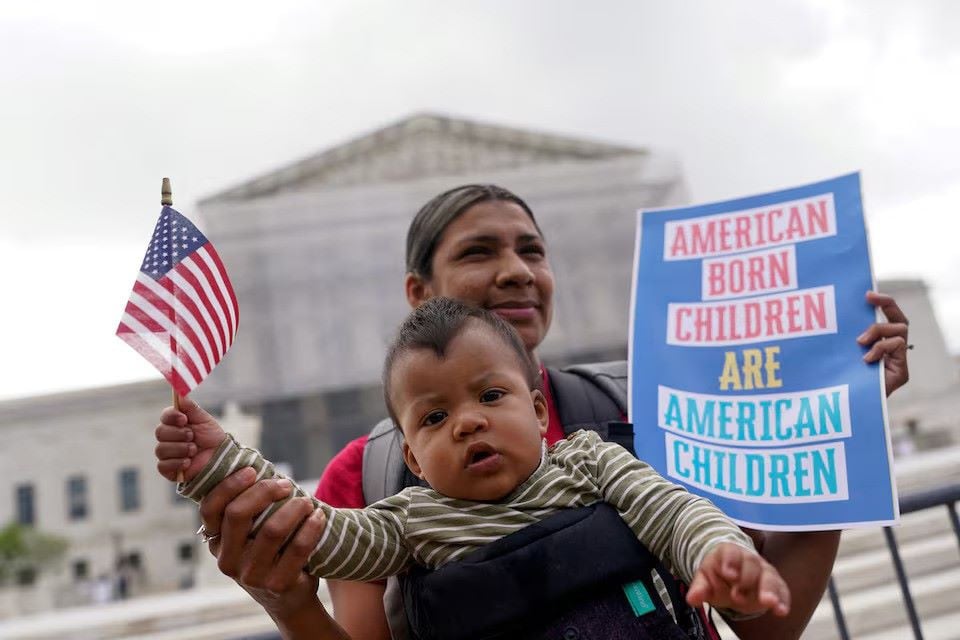The US Supreme Court dealt a blow on Friday to the power of federal judges by restricting their ability to grant broad legal relief in cases, as the justices acted in a legal fight over President Donald Trump’s bid to limit birthright citizenship. The court ordered lower courts that blocked the policy to reconsider the scope of their orders.
However, the court’s 6-3 ruling, authored by conservative Justice Amy Coney Barrett, did not let Trump’s policy go into effect immediately and did not address the policy’s legality. The justices granted a request by the Trump administration to narrow the scope of three nationwide injunctions issued by federal judges in Maryland, Massachusetts, and Washington state that halted enforcement of his directive while litigation challenging the policy plays out.
With the court’s conservatives in the majority and its liberals dissenting, the ruling specified that Trump’s executive order cannot take effect until 30 days after Friday’s ruling.
“No one disputes that the Executive has a duty to follow the law. But the Judiciary does not have unbridled authority to enforce this obligation — in fact, sometimes the law prohibits the Judiciary from doing so,” Barrett wrote.
Justice Sonia Sotomayor, in a dissent joined by the court’s other two liberal members, wrote, “The majority ignores entirely whether the President’s executive order is constitutional, instead focusing only on the question whether federal courts have the equitable authority to issue universal injunctions. Yet the order’s patent unlawfulness reveals the gravity of the majority’s error and underscores why equity supports universal injunctions as appropriate remedies in this kind of case.”
Trump welcomed the ruling in a social media post. “GIANT WIN in the United States Supreme Court,” Trump wrote on Truth Social.
On his first day back in office, Trump signed an executive order directing federal agencies to refuse to recognize the citizenship of children born in the United States who do not have at least one parent who is an American citizen or lawful permanent resident (i.e., a green card holder).
More than 150,000 newborns would be denied citizenship annually under Trump’s directive, according to the plaintiffs who challenged it — including the Democratic attorneys general of 22 states, immigrant rights advocates, and pregnant immigrants.
The case before the Supreme Court was unusual in that the administration used it to argue that federal judges lack the authority to issue nationwide, or “universal,” injunctions. It asked the justices to rule that way and enforce the president’s directive even without weighing its legal merits.
In her dissent, Sotomayor said Trump’s executive order is obviously unconstitutional. So rather than defend it on the merits, she wrote, the Justice Department “asks this Court to hold that, no matter how illegal a law or policy, courts can never simply tell the Executive to stop enforcing it against anyone.”
“The gamesmanship in this request is apparent and the Government makes no attempt to hide it,” Sotomayor wrote. “Yet, shamefully, this Court plays along.”
Federal judges have taken steps including issuing nationwide orders impeding Trump’s aggressive use of executive action to advance his agenda.
The plaintiffs argued that Trump’s directive ran afoul of the 14th Amendment, ratified in 1868 in the aftermath of the Civil War. The amendment’s citizenship clause states that all “persons born or naturalized in the United States, and subject to the jurisdiction thereof, are citizens of the United States and of the state wherein they reside.”
The administration contends that the 14th Amendment, long understood to confer citizenship to virtually anyone born in the United States, does not extend to immigrants who are in the country illegally, or even to those lawfully present on temporary visas — such as students or workers.
In a June 11–12 Reuters/Ipsos poll, 24% of all respondents supported ending birthright citizenship and 52% opposed it. Among Democrats, 5% supported ending it, with 84% opposed. Among Republicans, 43% supported ending it, with 24% opposed. The rest were unsure or did not respond.
The Supreme Court, which has a 6-3 conservative majority, has handed Trump some important victories on immigration policy since he returned to office in January. On Monday, it cleared the way for his administration to resume deporting migrants to countries other than their own without giving them a chance to show the harms they could face.
In separate decisions on May 30 and May 19, the court allowed the administration to end temporary legal status previously granted to hundreds of thousands of migrants on humanitarian grounds. But on May 16, the court kept in place its block on Trump’s deportation of Venezuelan migrants under a 1798 law historically used only in wartime, faulting the administration for seeking to remove them without adequate due process.
The court heard arguments in the birthright citizenship case on May 15. US Solicitor General D. John Sauer, representing the administration, told the justices that Trump’s order “reflects the original meaning of the 14th Amendment, which guaranteed citizenship to the children of former slaves, not to illegal aliens or temporary visitors.”
An 1898 US Supreme Court ruling in United States v. Wong Kim Ark has long been interpreted as guaranteeing that children born in the United States to non-citizen parents are entitled to American citizenship. Trump’s administration has argued that the ruling was narrower, applying only to children whose parents had a “permanent domicile and residence in the United States.”
Universal injunctions — which prevent a policy from being enforced against anyone, not just the suing parties — have been opposed by presidents of both parties. Proponents argue they are an efficient check on presidential overreach and have blocked actions deemed unlawful by both Republican and Democratic administrations.




